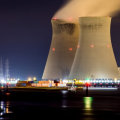Fossil fuels are the dirtiest and most dangerous sources of energy, while modern renewable and nuclear energy sources are immensely safer and cleaner. Nuclear energy is a clean energy source with no emissions. It is much safer than its reputation implies, and it is also clean and reliable. Despite this, power plants are being phased out around the world.
Nuclear energy offers several advantages in the transition to clean energy. It releases less radiation into the environment than any other major energy source. This may seem paradoxical, since non-nuclear power sources are not commonly known to release radiation into the environment. The worst offender is coal, a mineral in the Earth's crust that contains a substantial volume of the radioactive elements uranium and thorium.
When coal is burned, it gasifies its organic materials, concentrating its mineral components in the remaining residues, called fly ash. So much coal is burned in the world and so much fly ash is produced that coal is actually the main source of radioactive emissions into the environment. President Dwight Eisenhower was well aware of this black cloud hanging over atomic energy, and he accompanied the deployment of nuclear electricity with a marketing bombardment. This has been good news for companies like X-Energy, and for the world if their designs live up to their potential.
However, it has only recently been beneficial for existing nuclear infrastructure. The distinction between these two aspects of environmentalism has caused a gap within the scientific community around nuclear energy. Plans to build new nuclear plants face concerns about competitiveness with other power generation technologies and the sheer size of nuclear projects that require billions of dollars in upfront investments. The NICE Future Initiative is a global effort under the Clean Energy Ministerial that ensures that nuclear energy is taken into account in the development of advanced clean energy systems of the future.
Without further useful life extensions and new projects, this could result in an additional 4 billion tons of CO2 emissions, emphasizing the importance of the nuclear fleet for low-carbon energy transitions around the world. For too many environmentalists concerned about global warming, nuclear energy is today seen as devil's excrement. It is essential to maintain human skills and industrial experience for countries that aspire to continue to rely on nuclear energy. Securing investment in new nuclear power plants would require more intrusive political intervention, given their very high cost and recent unfavorable experiences in some countries. Countries that foresee a future role for nuclear energy account for the bulk of global energy demand and CO2 emissions.
Ongoing activity in the operation and development of nuclear technology is required to maintain skills and experience. As nuclear energy faces an uncertain future in many countries, there is a risk of a sharp decline in its use in advanced economies, which could generate billions of tons of additional carbon emissions. For different reasons — from conservatives concerned about air pollution and energy shortages to former Green Party members concerned about climate change — both have come to consider it a shame that nuclear energy is being neglected. Moving away from nuclear power after Fukushima, Japan plans to build 22 new coal plants in the next five years. A collapse in investment in new and existing nuclear plants in advanced economies would have implications for emissions, costs and energy security.






